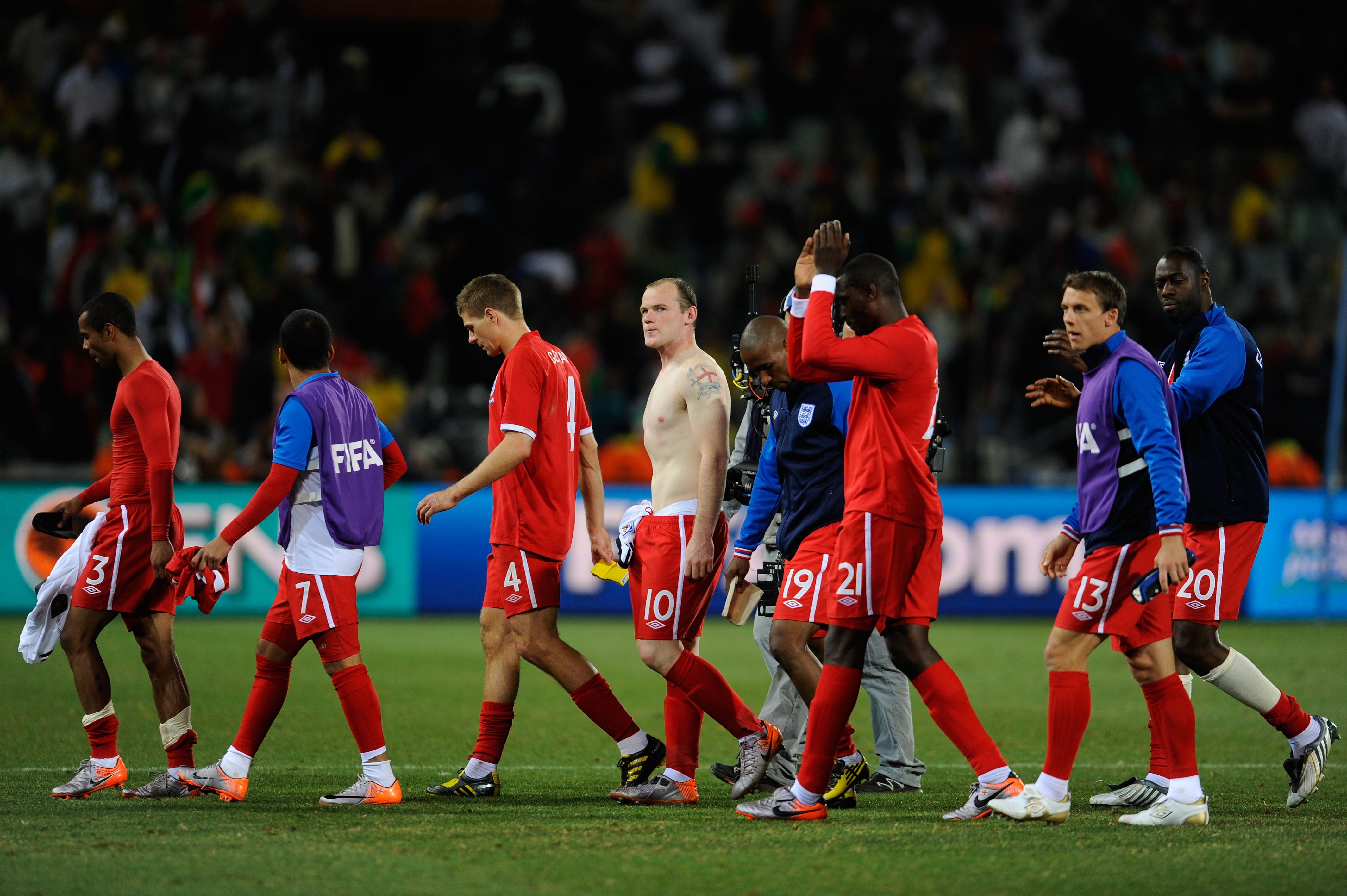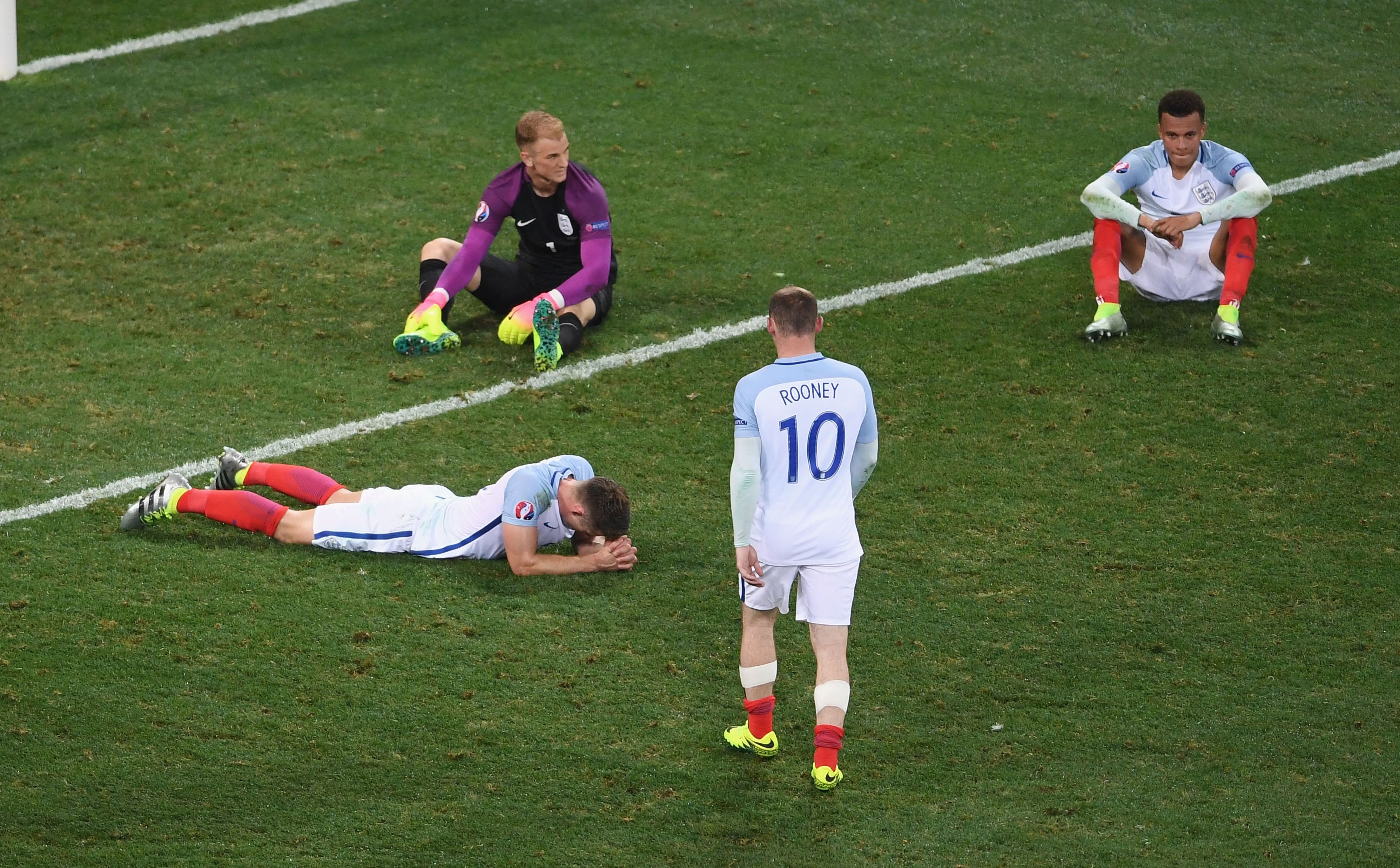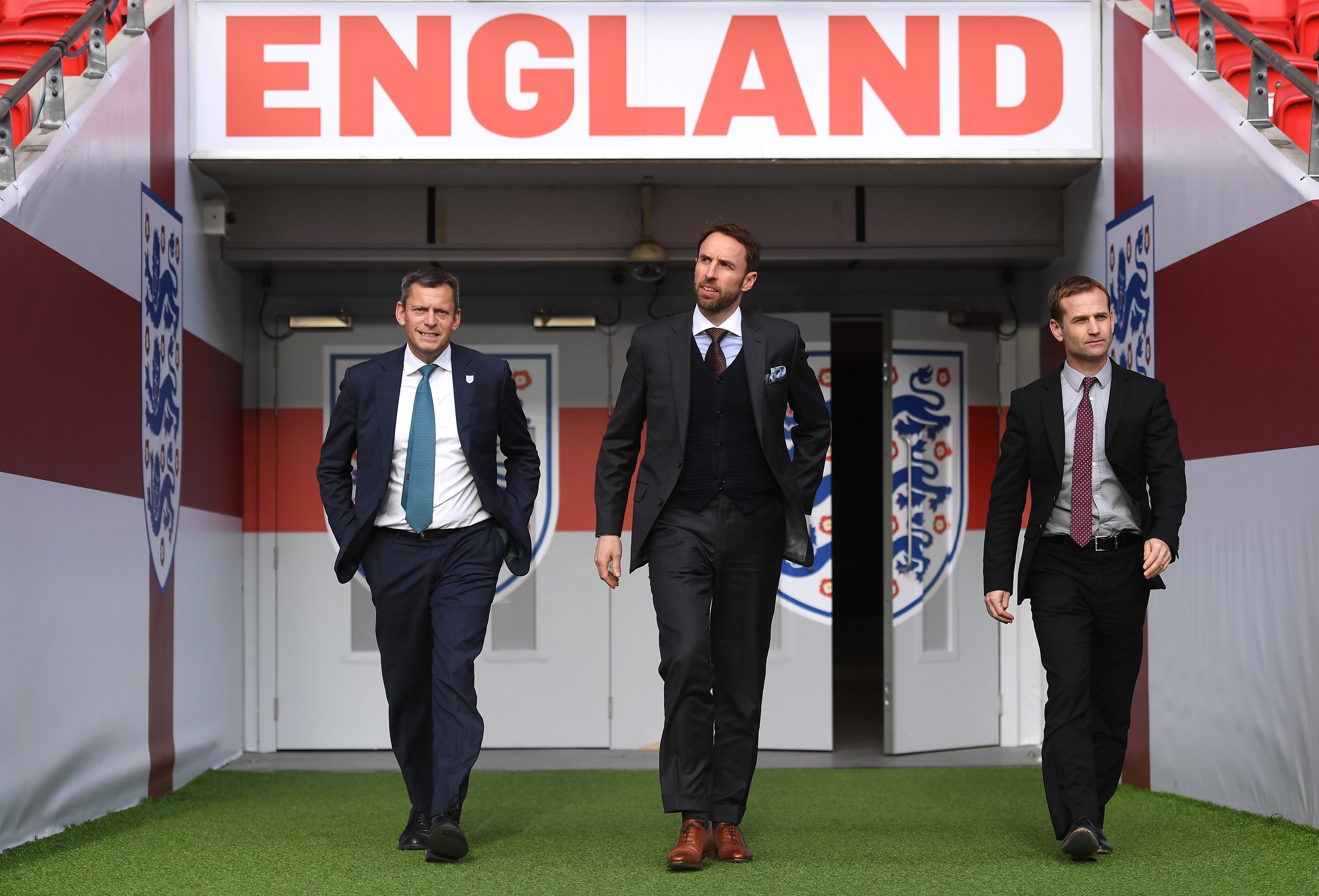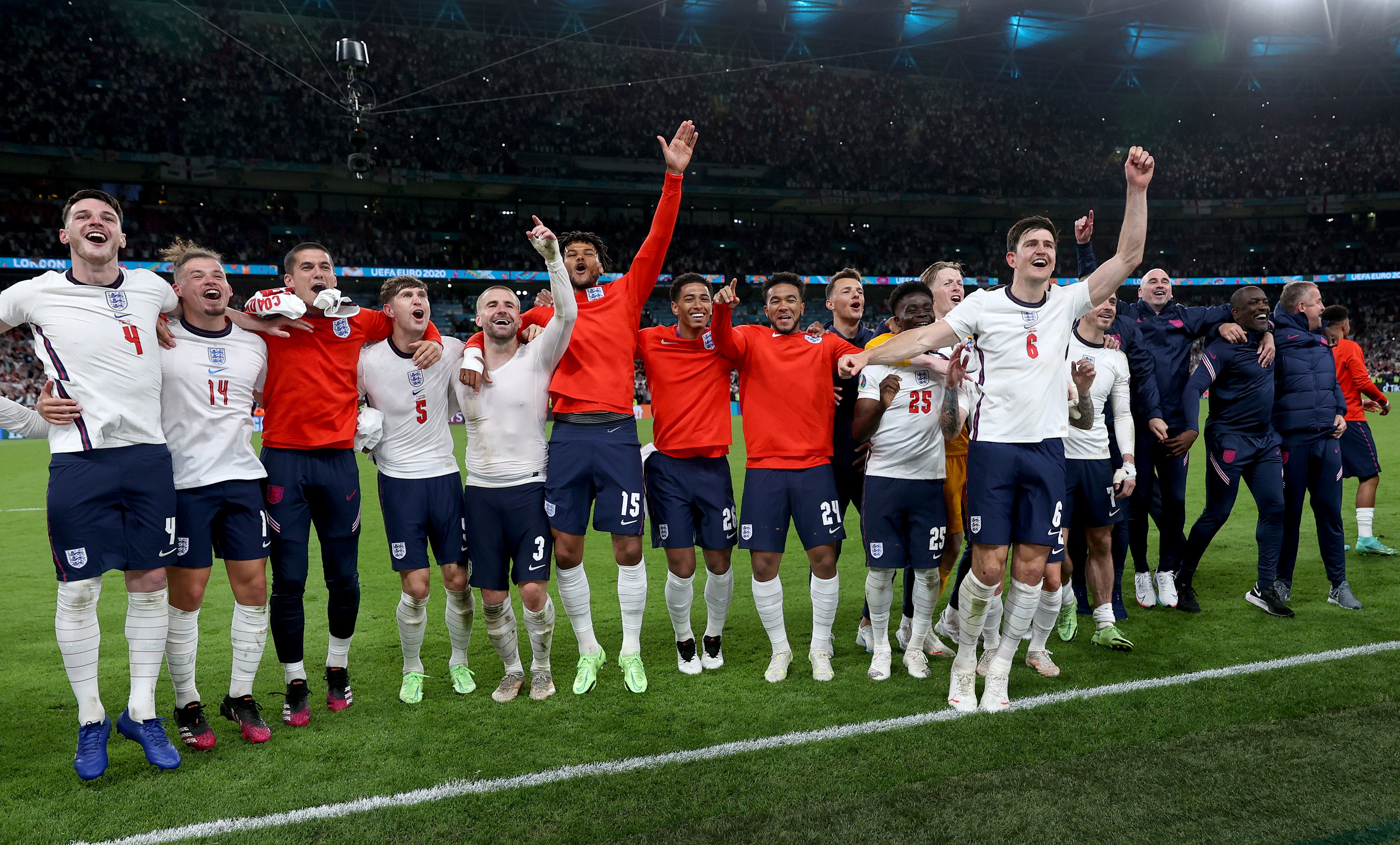From failure to a final – how England turned a ‘joke’ into joy
From the nadir of Iceland in 2016, Gareth Southgate has rebuilt a team and a nation’s football culture, writes Miguel Delaney


Your support helps us to tell the story
From reproductive rights to climate change to Big Tech, The Independent is on the ground when the story is developing. Whether it's investigating the financials of Elon Musk's pro-Trump PAC or producing our latest documentary, 'The A Word', which shines a light on the American women fighting for reproductive rights, we know how important it is to parse out the facts from the messaging.
At such a critical moment in US history, we need reporters on the ground. Your donation allows us to keep sending journalists to speak to both sides of the story.
The Independent is trusted by Americans across the entire political spectrum. And unlike many other quality news outlets, we choose not to lock Americans out of our reporting and analysis with paywalls. We believe quality journalism should be available to everyone, paid for by those who can afford it.
Your support makes all the difference.When Gareth Southgate finally got back into the euphoric England dressing room, a little breathless and bashful after his celebrations with the crowd, he was asked what it means to be an international finalist. It is a distinguished position only one other England manager has been in. There was a pause, as Southgate seemed to suddenly take in the magnitude of the feat.
“I don’t think it’s really sunk in yet,” Southgate beamed. “I’m still running through everything that happened in the game in my head.”
Southgate admitted he retained the calculation of a manager even in the moment of victory, and was considering elements that could be improved on, but there were many aspects of the day that offered profound satisfaction. There was the rehearsed move that saw Bukayo Saka set up Raheem Sterling with a cut-back for the opening goal. There was the mental resolve shown in recovering from that first goal conceded. There was the spell of possession that professionally saw the game out.
These moments all represent significant maturation from the England team, as well as over a decade of work, that has set the country up for its biggest game in 55 years.
Whatever happens on Sunday, the national team – and the national football culture – have been on a real journey. That is a journey from the humiliation of Iceland 2016 to the unique glory of Wembley 2021; from failure to final; from a team derided as a “joke” just a decade ago to a culture now seen as a model. One of the showpiece international fixtures may become a showcase for a restored football nation.
As well as tournament finalists, England have finally become what they always looked to in so many previous failures. They have become an example to follow. The Germans, Spanish and Argentines were already studying English football to see how they produced so much talent even before this tournament.
That is a huge turnaround, that comes from a series of steps and barriers, many of which directly involved Southgate. Countless other figures who were influential in this process were punching the air on Wednesday, but that was at some of the passing as much as the goals.
“There were plenty of times when it looked like England might retreat, but the ball retention for the final few minutes of the game was something you would never usually see from an England team,” says Huw Jennings, academy director at Fulham.
What could be definitively seen were the effects of so much work, and a lot of decisions that weren’t necessarily popular at the time. This revolution wasn’t all 100 per cent intentional, or unique to England, either.
As has become the standard narrative in the story of resurgent football nations, this goes back to the revolutionising of youth development. England are just the latest wealthy western European country to industrialise talent production. That is what has won every World Cup and European Championships since 2008, and that is what the FA had to look to. The 2014 England DNA plan involved studies of nine major countries, six from Europe and three from South America.
That still involved an important step that was unique to England, though, because of the “insularity” of its football culture. The politics are well known, and still bring a sigh from the many sources spoken to for this piece.
“I think we were very introspective,” Jennings says. “That has unquestionably changed. We’ve become much more open to learning, and that has enabled leaders in sport to explore alternative approaches. But you can also go back to the inception of the academy movement, and the immense impact of small-sided football. It seems remarkable to say that now, but the huge range of positions that a Mount or a Saka can play comes from that.”
The reality is that England still produced talent, as the now-parodied “Golden Generation” illustrated. It was just that there was a lack of unifying structure, the splits bleeding out into so many other areas – not least a fractured national team. By the disaster of 2010, Fabio Capello’s side was as disjointed as the country's whole football system. England teams still seemed lacking in basic possession – a remarkable thing to say when its clubs were winning the Champions League.

“When I came into the academy system, we were all heart and never gave up, but we were lacking technically against our European counterparts,” says Mark Allen, former director at Manchester City and now at Swansea City. “We would have been miles behind had we not adjusted when we did.”
The Premier League had become a problem. Its very wealth was leading to a poverty in terms of youth production, because clubs were increasingly looking abroad. Former chief executive Richard Scudamore, of all people, decided something should be done.
Always attuned to the reputation of his competition, but equally intent on improving the English game as a whole, Scudamore pushed through the Elite Player Performance Plan (EPPP) in 2011. The core of it was that the Premier League clubs would offer huge funding to the 92 academies, forcing the competition to align with the FA and Football League for the first time in its history. That was immensely significant, and was the most visible influence from Germany.
EPPP went through many drafts, and had a lot of criticisms. There was a feeling it was too bureaucratic, that it took away from “grass time”, and that it allowed Premier League clubs to prise talent from those underneath far too cheaply. The net effect was still that it improved coaching, facilities and the general infrastructure around youth development, while also embedding a unifying philosophy for the first time. At least 17 of England’s 26-man squad have come through the system.
“What EPPP probably did was bring everybody along and make it a base requirement to have certain standards,” Allen says.
Change was slow, but happening. Dan Ashworth had been one figure supportive of EPPP as technical director of West Brom, and within a year was driving changes of his own at the FA, as St George’s Park was completed. The low was still to come in the 2014 World Cup. The final step before the rise arrived mere months later, as Ashworth presented the England DNA document in 2014. Prioritising technical quality, the plan wasn’t without its criticism or backlash either.
“Many in the game were mocking England DNA,” one source from the top level of the English game says. “I’m proud because I backed it, as I thought it was a brilliant idea. Inside the playing model were details that I believed in. I knew that was the way we needed to go.” That way was an approach that was “in line with the best in the world”. England players would first of all be coached to build play and possess the ball like the Spanish, as can be seen in a technician like Phil Foden. They would learn the tactical appreciation of the Italians, as can be seen in the positional adaptability of Saka. They would be conditioned to press like the Germans, as can be seen with the relentlessness of Mason Mount.
The Premier League began to become a significant solution rather than a problem, too. In 2011, when EPPP was launched, only two of its teams could be described as playing out from the back in a defined possession game. That was up to 15 by the end of 2020-21, with Pep Guardiola’s 2016 arrival having greatly accelerated the process. At least five of the greatest coaches in modern football history have worked in England over the last decade, and that has only deepened the education of sophistication of players.
“We’ve had knowledge and influence from all around the world,” the same source says. “It’s almost like merchants arriving on ships to new countries for the first time, spreading ideas. Once you understand these ideas and the game as our staff and players do, you have the choice to play like Spain or Italy or Germany.” This does raise the wider discussion over whether a “national style” can even truly exist any more. None of these are really Spanish or German or English ideas, but instead best practice from a truly globalised game. Any innovations – as we may be seeing with the Italians – come from within that.
This doesn’t mean that a national side has an inherent style that is an inevitable consequence of these structures. They still require design, and England benefitted in that regard from an initially unhappy accident. It is striking to think how different the history of the team might have been had Sam Allardyce not been forced out by controversy.
For all of Southgate’s planning, his reign wasn’t the product of any proper succession plan. He didn’t even want the job at first. He knew all the baggage that came with the senior job, the cliques, the pressure, the circus. There is actually an argument that Allardyce would have been exactly the right ringmaster for that circus. His approach could have worked very well in international football, but it would have been something much more detached from this FA design. One of the reasons for Southgate’s initial reluctance was in fact because he felt the squad at that point might have been unreceptive to these deeper ideas.

“What persuaded me was that the players were willing to adapt to the approach that we had and embrace the way we wanted to work,” he says.
Southgate had a very clear vision for what he felt international football should be. He had been head of elite development alongside Ashworth, before taking the under-21 job in 2012. In an idle moment in Rome on the night of the Ukraine game, Southgate and assistant Steve Holland found themselves discussing their first match together with that squad, a 1-0 win over Moldova at the Madejski Stadium. John Stones and Luke Shaw were the full-backs, with goalscorer Saido Berahino restricting Harry Kane to a mere four minutes from the bench, where Eric Dier and Jesse Lingard sat for the whole game.
For posterity, the starting XI was: Jack Butland, Stones, Shaw, Andre Wisdom, Michael Keane, James Ward-Prowse, Nathan Chalobah, Nathan Redmond, Tom Carroll, Wilf Zaha and Berahino. It wasn’t quite the team of 2021, but a good proportion have played senior football under Southgate, and Jennings believes it is the culture that is of greater significance.
“If you assess the winners of World Cups and European Championships, you can often track them back to tournament success at youth level,” Jennings argues. “Even though the players will sometimes change, there’s a mindset and understanding of how to win tournaments.” That was seen in the victories of 2017 – in the under-19 European Championships as well as the under-17 and under-20 World Cups – where all of Foden, Mount, Reece James, Jadon Sancho, Dean Henderson and Dominic Calvert-Lewin picked up their first international medals.
Southgate proved quite prescient after that first match against Moldova. “There’s a lot of talk about what English players can and can’t do in terms of keeping possession and passing the ball,” he said at the time. “There’s quite a rich group of talented players coming through but talent alone won’t be enough.” A plan was required. By the time he took the senior job, Southgate had a clear idea of how he wanted to maximise that talent. His background ensured that – almost by accident – there was finally a fit between the profile of the England manager and the structure he was overseeing.
Southgate first had to tackle something more immediate, that headed up everything. That was the collective psychology of the team. It created a fractured and politicised squad, which simply couldn’t handle the pressure built up around them. The nadir was Iceland. Holland was watching the game on holiday and remembers thinking “bloody hell, they have gone”. Both he and Southgate felt this was an absolute case study of a sports team that “freezes”.

They decided to conduct a study of their own, to figure out what went wrong and how it could be addressed. The atmosphere around the team was toxic. Players just didn’t enjoy anything about it. As late as 2014, there were still stories of the players from the big clubs sitting on separate tables in dining area. A clique from one simply didn’t mix with the rest outside of meals or training, and would just go up to their rooms on downtime. There was an air of suspicion, that was made more acute by the oppressive expectation. “If we lost, it was the end of the world,” John Terry said at Wembley on Wednesday. One source goes much further. “Loads of them thought each other were c****”.
That couldn’t be more different to now. The word from St George’s Park is that lads like Foden love it because they see it as “being away with their mates”. There is a genuinely great spirit. This is why there has been no dissent or disgruntlement about team selection. “They've all accepted the role, they've all bought into what we're doing as a group,” Southgate said. “They’ve got tremendous respect for each other and it's created a culture and a feeling amongst the group that there is that genuine togetherness and excitement for each other and they are all in a final now.”
The senior players are meanwhile content in their role as “tribal elders”, standing back because they know the young talent are “the stars”. There’s no jealousy or suspicion. There are just plenty of jibes about those who watch Love Island from those who don’t.
More serious incidents played their part. The racism many players suffered in Montenegro and Bulgaria was grotesque, but the manner in which all reacted and backed each other deepened connections. Some individuals particularly affected were hugely impressed – and touched – by the righteous support of others, particularly those like Henderson and Tyrone Mings. There was a sense of teammates having each other's back.
“We had really open conversations as a group where people got to know each other a bit better, got to know each other’s feelings, respect their views,” Southgate said. The unbending stance on bending the knee only solidified this. It was all such a far cry from what Southgate inherited in 2016.
The manager first cultivated this atmosphere by looking to other sports, and essentially introducing New Zealand rugby’s “no d***heads” policy. There would be a code of conduct with the squad. Players seen as disruptive or divisive were cast out. It is why Southgate has been particularly strong on specific incidents of indiscipline, like those that involve potential club rivalries. Media relations were drastically improved so that the press weren’t just seen as a body who create that notorious pressure, but there was a concerted attempt to tackle the very reaction to any pressure.
In Southgate’s first extended international break, he brought the squad away to a military boot camp with the marines. The staff wanted to condition clearer thinking under pressure. One exercise involved going through a dark tube under waist-high water. There was a marine either side so it was completely safe, but few players felt any way comfortable. They just had to work their way through. The idea was to relate the memory of that back to football, so any setbacks don’t seem so severe, and the players can work through them rationally.
That alone isn’t going to win you football matches but the results from the wider process could be seen in that first half against Denmark. Many might have expected England to “freeze” after that first true setback of the tournament, as they conceded their first goal. They instead only revved up, showing much more than resolve. Within minutes, Saka, Harry Kane and Raheem Sterling were combining for moves that were at once “automatisms” unique to England but also reminiscent of so many goals scored by Guardiola’s Manchester City.

This is the depth of development made clear. “All the changes over the last eight to 10 years are now bearing fruit,” Allen says. “You’re starting to see that tactical or technical understanding coming home, the way they create those overloads, the way they so easily go from a three to a four at the back.”
If one remaining criticism is that England don’t produce enough of this given their talent, one consideration is that they are still a work in progress. There is a feeling in some quarters that the team is ahead of schedule, and that Southgate is building them step by step until they are a truly complete and integrated side.
“These players are still breaking barriers,” the manager said on Tuesday, and some barriers still remain. The performance against Denmark was only possible after something much more basic much earlier, after all. That was just winning a knockout game. That was the main objective Southgate set for the 2018 World Cup. “That was our first aim. That was where we saw the benchmark.”
A scientific approach to penalties as well as psychology aided that, as England met that objective against Colombia. Reaching the semi-final in Russia prompted another wide-ranging study: how to win a tournament. Portugal 2016 and France 2018 were seen as models for England. Southgate imparted the many lessons from that study, explaining why certain decisions would be taken. The players then learned from experience by living it.
England got through the group stage in comfortable but relatively contained fashion, although the idea was to reserve energy for the latter stages. It was why Kane was brought off at specific minutes in the opening games, with decisions tailored to forensic data on the players. “The physical preparation in England has got very, very good in comparison to other nations,” Jennings says. “It’s not due to mindset. It’s due to a programme. You could see it in the intensity on Wednesday.”
There is a fair criticism that Southgate’s entire approach can feel programmed, from the reasons for selection to the football. As one source says, “it is as if he is trying to win a tournament by consulting a manual”. You might even call it Ikea’s Euro 2020. It is possible, however, that England 2021 may themselves serve as a blueprint for winning a tournament – or at least regularly going the distance.
Even the pre-tournament debate about Southgate’s “best XI” now seems so outdated. He has solved the problem of having too much attacking talent by just using all that talent at different moments, tailored to specific tactical challenges.
It was that which saw a notionally defensive 3-4-3 ultimately outsmart Germany, in what was seen as a “transformative moment” for the squad. That brought release against Ukraine and resilience against Denmark.
The good spirit in the camp keeps everything fresh. The atmospheres at Wembley have created an emotional wave.
Many of the players, and indeed Southgate himself, were describing the squad singalong to “Sweet Caroline” after Denmark as among the greatest moments of their careers. The greatest moment with England may yet await. They just face what is by far the biggest challenge of the tournament, a level above anything they have faced so far.

It is entirely possible that Italy become a model for how England are still getting some things wrong. The Italians have been on an almost identical journey, as a previously insular football culture that has opened out and gone through a revolution, but with the result so far of much more expansive football. It is possible they show England how you really do it. If so, it will just be one final step required. So much is already in place.
“The other thing that is so positive is these young players are getting more experiences of England that are positive and enjoyable,” Southgate says. “They’re feeling what it can be like to be in an England shirt and have fun, win matches, and have a relationship with the fans that is positive. That is so important for a generation to come.”
Many coaches involved feel there is more to come. “Maybe this is the start of a British cycle in many respects,” Allen says. “We have many admirers from other countries,” Jennings says. “Irrespective of what happens on Sunday, the current movement is an expression that says there is an English way that has a lot of merit to it.”
Whatever about football coming home, Euro 2020 has seen England re-establish itself as one of the great houses of the game. It is where many others are looking to for inspiration.
Join our commenting forum
Join thought-provoking conversations, follow other Independent readers and see their replies
Comments